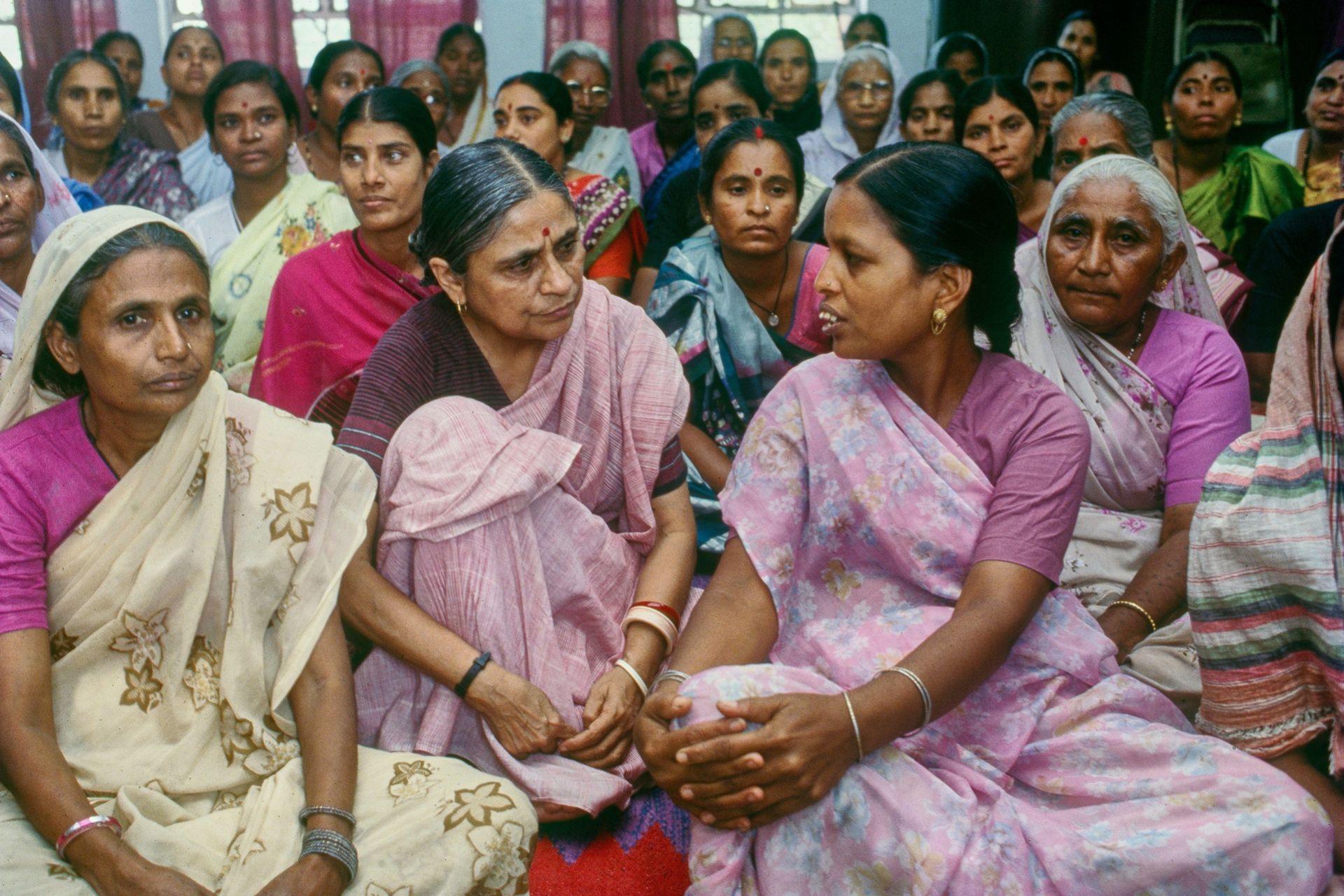尊敬的用户您好,这是来自FT中文网的温馨提示:如您对更多FT中文网的内容感兴趣,请在苹果应用商店或谷歌应用市场搜索“FT中文网”,下载FT中文网的官方应用。
It was 1989, and police had come to clear a women’s sit-in. The protesters worked as vendors and Ahmedabad’s municipal corporation wanted them off the street, a move that would jeopardise their livelihoods. But the officers had not reckoned with a petite union leader who argued for two hours — until they finally gave in.
那是1989年,警察来清理一场妇女静坐示威。抗议者是小商贩,艾哈迈达巴德市政公司要求他们离开街道,此举将危及他们的生计。但官员们没想到,一个身材娇小的工会领袖竟然争论了两个小时——直到他们最终让步。
The policemen had come up against India’s “gentle revolutionary”. An activist who championed collective power, Ela Ramesh Bhatt, affectionately called Elaben (ben means sister), died earlier this month. Pioneering financial services for poor women, Bhatt fought tirelessly against poverty, and became a global feminist icon with admirers from Nelson Mandela to Hillary Clinton.
警察们遇到了印度的“温柔革命者”。倡导集体权力的活动人士埃拉•拉梅什•巴特(Ela Ramesh Bhatt),被亲切地称为埃拉本(Elaben,ben意为姐姐),于本月早些时候去世。巴特开创了为贫困妇女提供金融服务的先驱者,不知疲倦地与贫困作斗争,并成为全球女权主义的偶像,纳尔逊•曼德拉(Nelson Mandela)和希拉里•克林顿(Hillary Clinton)也是其崇拜者。
Born to a well-off family in Gujarat in 1933, Bhatt’s early life was steeped in India’s freedom struggle against British colonialism. She attended school and college in Surat, before studying law in regional capital Ahmedabad, dubbed the “Manchester of India” for its textile mills. She later married fellow student leader Ramesh Bhatt.
巴特1933年出生于古吉拉特邦的一个富裕家庭,他的早年生活沉浸在印度反对英国殖民主义的自由斗争中。她在苏拉特上了中学和大学,之后在地区首府艾哈迈达巴德学习法律。艾哈迈达巴德因其纺织厂而被称为“印度的曼彻斯特”。后来,她嫁给了学生领袖拉梅什•巴特(Ramesh Bhatt)。
Bhatt joined the Textile Labour Association’s legal team soon after university and began battling for unionised workers’ rights. At that time, “we were rebuilding the nation, looking to a more just society,” the lawyer recalled in 2010.
大学毕业后不久,巴特就加入了纺织劳工协会的法律团队,开始为工会工人的权利而奋斗。那时候,“我们正在重建国家,希望建立一个更加公正的社会,”这名律师在2010年回忆道。
In fighting for the union, Bhatt realised most workers were not unionised, and had neither protection from exploitation nor regular salaries. This so-called informal sector, which most female workers belonged to, spanned home-based craftspeople, street vendors and small-scale farmers.
在争取工会的过程中,巴特意识到大多数工人没有加入工会,既没有免受剥削的保护,也没有固定的工资。这个所谓的非正规部门,大多数女性工人都属于这个部门,包括以家庭为基础的手工业者、街头小贩和小农。


Determined to change this, Bhatt started the Self-Employed Women’s Association (SEWA) in 1972, India’s first working women’s movement. “As individual workers they were invisible, isolated, and totally powerless,” she said in 2017. “By creating the union they laid claim to their status as workers for the first time”.
为了改变这种状况,巴特在1972年成立了自由职业者妇女协会(SEWA),这是印度第一个职业妇女运动。“作为个体工人,他们是隐形的、孤立的、完全无权的,”她在2017年说。“通过建立工会,他们第一次宣称自己是工人”。
The first 6,000 members took a decade to recruit. Today SEWA is India’s biggest union — it counts 2.1mn members and provides services from healthcare to training. Bhatt was general secretary for over two decades. SEWA members flocked to Ahmedabad in their thousands for her funeral.
第一批6000名成员的招募花了10年时间。今天,SEWA是印度最大的工会,拥有210万会员,提供从医疗到培训的各种服务。巴特担任秘书长超过20年。数千名SEWA成员涌入艾哈迈达巴德参加她的葬礼。
But what Bhatt described as “changing the balance of power in favour of the poor” was not accepted by the rich and powerful, and SEWA met with “constant tension, with big farmers, moneylenders, contractors, big traders, government”. Bhatt also clashed with the male-dominated unions, confronting their refusal to recognise informal workers.
但巴特所描述的“改变权力平衡,使之有利于穷人”并没有被有钱有势的人所接受,SEWA遇到了“与大农场主、放贷人、承包商、大商人、政府之间持续的紧张关系”。巴特还与男性主导的工会发生了冲突,反对他们拒绝承认非正式工人。
Bhatt knew finance was critical to eradicating poverty. Loan sharks preyed on self-employed workers, without bank accounts or health insurance, whenever they suffered mishaps from crop-ruining storms to injuries. So in 1974, SEWA started a women’s bank.
巴特知道金融对消除贫困至关重要。高利贷者在没有银行账户或医疗保险的个体户身上搜刮,尤其当他们遭遇从破坏庄稼的风暴到受伤的灾难。1974年,SEWA成立了一家妇女银行。
“Poor women are economically active,” the micro-financing pioneer argued, and “should not be considered unbankable”. Bhatt insisted on putting money in their hands rather than their husbands’. Women were more prudent and productive with money, she contended; SEWA’s loan recovery rates supported her thesis, at well over 90 per cent. She became a founding member of global microfinancing network Women’s World Banking in 1979.
“贫困妇女在经济上是活跃的,”这位小额融资的先驱认为,“不应被认为是无法获得银行贷款的”。巴特坚持把钱交到她们手里,而不是她们的丈夫手里。她认为,女性在花钱方面更谨慎、更有效率;SEWA的贷款回收率远远超过90%,支持了她的论点。1979年,她成为全球小额融资网络妇女世界银行的创始成员。
In the mid-1980s, Bhatt had a brief parliamentary foray when she chaired a national commission on self-employed women, forcing the cause into the spotlight. Poverty “is man-made”, said Bhatt years later, “and therefore always a political question.”
20世纪80年代中期,巴特曾短暂进入议会,当时她主持了一个全国自主创业妇女委员会,迫使这项事业进入聚光灯下。多年后,巴特说,贫穷“是人为的,因此永远是一个政治问题。”
But politics was troublesome. In 2005, Gujarat’s state government, led by now prime minister Narendra Modi, alleged financial irregularities in state-funded SEWA work. SEWA denied the allegations, accusing the administration of “harass[ing] and discredit[ing] SEWA”.
但是政治是麻烦的。2005年,由现任总理纳伦德拉•莫迪(Narendra Modi)领导的古吉拉特邦政府声称,在国家资助的SEWA项目中存在财务违规行为。SEWA否认了这些指控,指责政府“骚扰和抹黑SEWA”。
Bhatt’s friend Shiv Visvanathan, an academic, remembers her as a formidable intellectual, with deep misgivings about Modi’s government: “she had an ethics,” he said, defining it as “a goodness that can sense evil”.
巴特的朋友希夫•维斯瓦纳坦(Shiv Visvanathan)是一名学者,在他的记忆中,巴特是一名令人敬畏的知识分子,对莫迪政府怀有深深的疑虑:“她有一种道德观,”他说,并将其定义为“一种能感知邪恶的善良”。
Bhatt — who served as chancellor of a university founded by Gandhi — embodied Gandhian simplicity, with her severe middle parting and khadi cotton saris, and her modest bungalow where she used her bed as a desk chair. Yet Bhatt was far from austere: she cultivated a love for Indian classical music and could often be found gossiping on the swing bench in her living room.
巴特曾担任甘地创办的一所大学的校长,她有着甘地式的简朴风格,严谨的中分和卡迪棉纱丽,她的平房朴实无华,她把床当桌椅用。然而,巴特一点也不严肃:她培养了对印度古典音乐的热爱,经常可以在起居室的秋千凳上看到她在闲聊。
A SEWA member now “knows that she is important”, Bhatt said in 2010. “She has a name, an address, a bank account number, an insurance policy, a pension plan . . . She is more aware that poverty is not destiny . . . what the women have gained is self-esteem”. Chloe Cornish
巴特在2010年说,一位妇女妇女协会的成员现在“知道自己很重要。她有姓名、地址、银行账号、保险单、退休金计划……她更加意识到贫穷不是命运。女性获得的是自尊”。